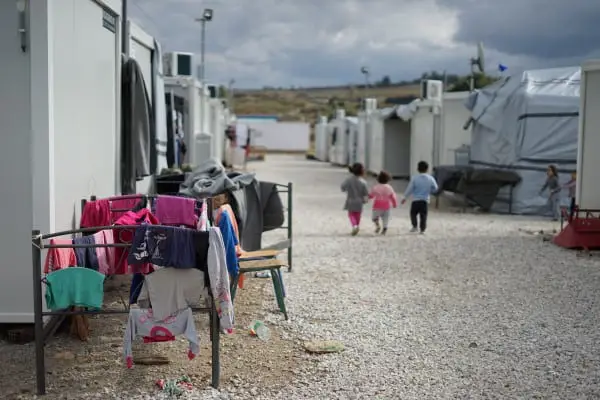This page contains affiliate links. This means if you a follow a link and make a purchase, at no additional cost to you, Humanitarian Careers will receive a commission. Thank you for supporting the site.
Humanitarian organisations refer to the field as the location where aid is actually delivered. Working in the field often means working in difficult and remote locations, but also means being where humanitarian aid is needed the most and seeing the true effect of helping people impacted by crises. Getting humanitarian field experience is key to developing a successful career in the aid industry.
To get humanitarian field experience, you should first develop the skills aid NGOs need in their field missions. Once you have the expertise needed, you can get humanitarian field experience by volunteering, applying directly to jobs in the field, or joining an NGO HQ and being transferred to a field position.
Getting humanitarian field experience is crucial to having a successful career in international aid. Although jobs in the aid industry are competitive, there are some proven routes to getting humanitarian field experience.
Get the Humanitarian Skills the Field Needs
The most important thing you need to do to get humanitarian field experience is get the practical skills needed. This is also the thing people wanting to work in humanitarian aid, and especially in field jobs, get wrong. Humanitarian NGOs need a range of practical skills to manage the delivery of aid in their field missions. Although having a theoretical knowledge of humanitarian action or international development is beneficial, when trying to get field experience, you should focus on developing practical expertise.
The skills needed to work in the field for humanitarian organisations are in three groups. The first is called the ‘technical’ areas. These include water and sanitation, shelter, nutrition, food security and livelihoods, protection of women, children and other vulnerable groups, medicine and mental health and education. If you want to get field humanitarian experience, qualifying in one of these areas and developing experience will provide you with the expertise needed for humanitarian field work.
The second area that humanitarian NGO’s need in the field are known as the ‘support’ functions. To get humanitarian field experience, you should consider developing knowledge of finance, human resources, logistics or supply chain management. Humanitarian agencies need people qualified in these areas in the field to assist with the management of aid projects. There is also often a shortage of people with these skills. If you want to get field experience in the humanitarian industry, consider these areas.
The third area of expertise that is needed in the field for humanitarian aid sit under ‘programmes and management’. If you want to get field experience with a humanitarian organisation, you could develop skills in coordination, programme management, grant and proposal writing or project monitoring and evaluation. In the field, humanitarian NGOs need qualified people with these skills, so focus on these areas if you want to get humanitarian field experience.
Importantly, although theoretical knowledge of humanitarian action and international development is valued in the aid industry, to get field experience you really need practical skills. It’s almost impossible to go from a master’s degree in development studies to the field – sadly, you just don’t have the skills the field needs. Definitely study a masters, but be sure to compliment it with some of the practical areas detailed above.
Humanitarian Aid Online Courses
If you are looking to work in humanitarian aid, we highly recommend the online course International Humanitarian and Development Careers. We think it provides one of the best overviews of the humanitarian sector and gives valuable insights for those searching for jobs in humanitarian aid. Follow the link to the course’s page for more information.
The International Humanitarian Law Theory and Practice online course offered by Leiden University in the Netherlands provides a fantastic theoretical overview of humanitarianism. We think it’s one of the top online courses for those who want to understand the basics of international humanitarian law. Click the link to visit the course’s page for more information.
We also think the Humanitarian Action Response and Relief online course offered by Coventry University is a must for anyone looking to become a humanitarian aid worker. It only takes around three weeks to complete and would be a major addition to the CV of anyone looking to work in the aid sector. The link is to the course’s page.
Humanitarian Volunteering to Get Field Experience
One you have practical humanitarian expertise aid NGOs need on the ground, one way to get field experience is to volunteer. The humanitarian industry is competitive, and getting field experience can also be tough. By volunteering, you have a chance to show humanitarian agencies the value of your practical skills, whilst also gaining field experience. Many humanitarians work unpaid, either in internships at HQ or in the field, at the beginning on their career. Getting volunteer field experience would be big benefit at the start of a humanitarian career.
To get humanitarian field experience through volunteering, you are best to approach the large and reputable volunteer schemes. Although some, short term ‘voluntourism’ trips can be ok, generally the view of the aid industry is turning away from these. You also are unlikely to gain real knowledge of the aid industry on these trips and so the time and money used may not benefit your career in humanitarian aid. One of the main reasons to get real, useful skills the field needs is that you can volunteer with reputable organisations and gain valuable field experience the aid industry will recognise.
If you are planning to get humanitarian field experience through volunteering, and have the expertise to go with a large and well-respected agency, there are several organisations you can gain field experience with. Examples of organisations to volunteer with to get humanitarian field experience include UN Volunteers, EU Aid Volunteers, US Peace Corps and UK VSO. Most countries government aid departments fund aid volunteering and joining these schemes is a fantastic way to get humanitarian field experience.
Transfer to the Field from an NGOs Headquarters
Another way to get humanitarian field experience is to join an aid organisation in their HQ and then request a transfer to a field job. This is a great way to get humanitarian field experience early in your career as you can prove yourself to an NGO at HQ level before getting field experience. Many international aid organisations send staff from HQ to the field to monitor projects or as short-term gap fill for field positions. By working in headquarters, you can apply for these short field missions to get more experience, before applying internally to a long-term humanitarian field job.

Get a Humanitarian Job Directly in the Field
Once you have humanitarian experience, either through volunteering or HQ work, you can apply for field jobs directly. Generally, to get a job in the field you need to have previous field experience. However, if you have less field experience, target smaller NGOs as they are more likely to take people with only volunteering or limited humanitarian field experience. Once you’ve had a year or more of field experience, target larger NGOs. Remember, having gained practical skills the humanitarian field needs you are more likely to get jobs directly in the field.
When looking for humanitarian jobs to get field experience, there are a few places you can apply. Firstly, humanitarian organisations list jobs on their websites and this includes field positions. A second place you can apply for humanitarian jobs with field experience is through job boards such as reliefweb.int. This lists almost every NGO job currently being recruited and is a great place to look for field experience. Again, remember, you will need previous field experience and practical skills to apply for job directly in the field.
Apply for Field Positions Through Emergency Rosters
A final way you can get humanitarian field experience is to apply to emergency deployment rosters for aid NGOs. Most humanitarian organisations keep a register of staff ready to deploy to the field at short notice for when crises occur. Applying to emergency rosters can be a great way to get humanitarian field experience as NGOs urgently need staff when disasters happen and can call on people with less field experience. If you are looking to get humanitarian field experience, apply to as many NGO rosters as you can. However, you will need some prior field experience to be included on an emergency register.
If you want to learn more about how to get humanitarian field experience, explore our list of the top humanitarian aid online courses here.






